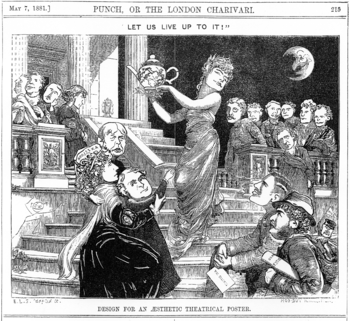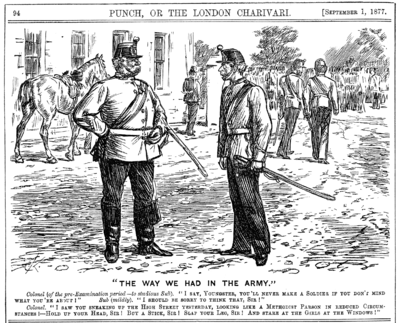
The Colonel (play)
Encyclopedia

Farce
In theatre, a farce is a comedy which aims at entertaining the audience by means of unlikely, extravagant, and improbable situations, disguise and mistaken identity, verbal humour of varying degrees of sophistication, which may include word play, and a fast-paced plot whose speed usually increases,...
in three acts by F. C. Burnand based on Jean François Bayard's Le mari à la campagne, first produced in 1844 and produced in London in 1849 by Morris Barnett as The Serious Family.
The Colonel was first produced on 2 February 1881, and its initial run at the Prince of Wales’s Theatre lasted for 550 performances, an extraordinary run in those days. Simultaneously, a second company was touring the British provinces with the play. On 4 October 1881, The Colonel received a command performance
Command Performance
Command Performance is a radio program which originally aired between 1942 and 1949. The program was broadcast on the Armed Forces Radio Network with a direct shortwave transmission to the troops overseas. It was not broadcast over domestic U.S...
before Queen Victoria (the first play to do so in twenty years (since the death of Prince Albert in 1861). The play transferred to the Imperial Theatre in 1883 and then to the new Prince of Wales Theatre
Prince of Wales Theatre
The Prince of Wales Theatre is a West End theatre on Coventry Street, near Leicester Square in the City of Westminster. It was established in 1884 and rebuilt in 1937, and extensively refurbished in 2004 by Sir Cameron Mackintosh, its current owner...
in 1884, built by the producer of The Colonel, Edgar Bruce, from the profits from the comedy's extraordinary success. In July 1887, there was a revival at the Comedy Theatre.
Background

Tartuffe
Tartuffe is a comedy by Molière. It is one of his most famous plays.-History:Molière wrote Tartuffe in 1664...
-type plot: a wealthy family is infiltrated by a religious impostor who threatens to gain control over the family fortune until an old friend comes to the rescue — in this version, an American colonel, the title character of the play. A young husband generally uses the pretence of going to the country to escape his oppressive domestic circumstances. The old friend restores the husband’s supremacy in his home by pointing out to the misguided wife the dangers inherent in suppressing innocent and fashionable pleasures in the name of an exaggerated devotion. Burnand's most important modification to this plot consisted in substituting "aesthetic" impostors for the religious hypocrites of the earlier versions — a fake "professor of aesthetics" is pitted against the practical American colonel.
Squire Bancroft
Squire Bancroft
Sir Squire Bancroft , born Squire White Butterfield, was an English actor-manager. He and his wife Effie Bancroft are considered to have instigated a new form of drama known as 'drawing-room comedy' or 'cup and saucer drama', owing to the realism of their stage sets.-Early life and career:Bancroft...
, manager of the Haymarket Theatre
Haymarket Theatre
The Theatre Royal Haymarket is a West End theatre in the Haymarket in the City of Westminster which dates back to 1720, making it the third-oldest London playhouse still in use...
had asked Burnand to create a new version of Bayard's story. Bancroft, however, decided not to stage the play, giving Burnand more license to freely adapt it. The "aesthetic craze,"
Aestheticism
Aestheticism was a 19th century European art movement that emphasized aesthetic values more than socio-political themes for literature, fine art, the decorative arts, and interior design...
was an obvious target for Burnand, who had been a regular contributor to Punch
Punch (magazine)
Punch, or the London Charivari was a British weekly magazine of humour and satire established in 1841 by Henry Mayhew and engraver Ebenezer Landells. Historically, it was most influential in the 1840s and 50s, when it helped to coin the term "cartoon" in its modern sense as a humorous illustration...
since 1863 and had become its editor in 1880 (a position he held until 1906). Beginning in the late 1870s, George du Maurier
George du Maurier
George Louis Palmella Busson du Maurier was a French-born British cartoonist and author, known for his cartoons in Punch and also for his novel Trilby. He was the father of actor Gerald du Maurier and grandfather of the writers Angela du Maurier and Dame Daphne du Maurier...
had published a long series of cartoons in the magazine satirizing the aesthetes. "The Colonel" was a recurring character in Punch. Punch had so frequently attacked the aesthetic movement, as The Observer noted, that The Colonel came at a point when it “might, indeed, have been thought that Punch had well nigh played the subject out.” Fun
Fun (magazine)
Fun was a Victorian weekly magazine, first published on 21 September 1861. The magazine was founded by the actor and playwright H. J. Byron in competition with Punch magazine.-Description:...
, a rival publication, wryly noted that Burnand should have acknowledged du Maurier as co-author. According to Burnand's memoir, Frederic Clay
Frederic Clay
Frederic Emes Clay was an English composer known principally for his music written for the stage. Clay, a great friend of Arthur Sullivan's, wrote four comic operas with W. S...
leaked the information to him that Gilbert and Sullivan
Gilbert and Sullivan
Gilbert and Sullivan refers to the Victorian-era theatrical partnership of the librettist W. S. Gilbert and the composer Arthur Sullivan . The two men collaborated on fourteen comic operas between 1871 and 1896, of which H.M.S...
were working on an “æsthetic subject”, and so Burnand raced to produce the play before the operatic duo's Patience
Patience (opera)
Patience; or, Bunthorne's Bride, is a comic opera in two acts with music by Arthur Sullivan and libretto by W. S. Gilbert. First performed at the Opera Comique, London, on 23 April 1881, it moved to the 1,292-seat Savoy Theatre on 10 October 1881, where it was the first theatrical production in the...
opened.
Burnand was "one of the most prolific dramatic authors and burlesque writers ever known, nearly 200 works standing to his credit."
Roles and original cast

- Colonel Wootwell W. Wood, U.S. Cavalry — Charles Francis CoghlanCharles Francis CoghlanCharles Francis Coghlan , Canadian actor, was born in Prince Edward Island, Canada, and was educated in law.He made his first London appearance in 1860, and became the leading actor at the Prince of Wales's Theatre. He starred in Sweethearts by W. S. Gilbert...
- Richard Forrester — W. Herbert
- Lambert Strekye — James Fernandez
- Basil Giorgione (his Nephew) — Rowland Buckstone
- Edward Langton [in love with Nellie] — Eric Bayley
- Mullins [Butler] — Mr. Rowley
- Parkes (Waiter) — Charles Cecil
- Romelli [Restaurateur & Confectioner] — Mr. Grey
- Lady Tompkins — Leigh Murray
- Olive (her Daughter, Forrester’s Wife) — Myra Holme
- Nellie (Forrester’s Sister [and Ward]) — C. Grahame
- Mrs. Blythe — Amy RoselleAmy RoselleAmy Roselle was an English actress who performed in Britain, the U.S. and Australia. She specialised in Shakespearean roles but also played parts in contemporary dramas. She married Arthur Dacre, and the two toured together with their own theatre company, eventually traveling to Australia...
- Goodall (her Maid) — Miss Houston

